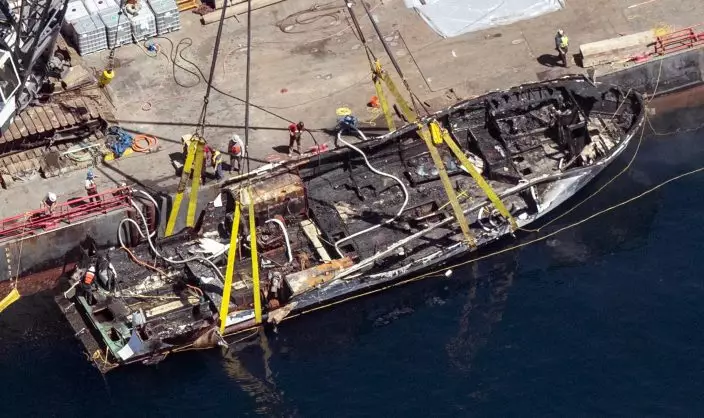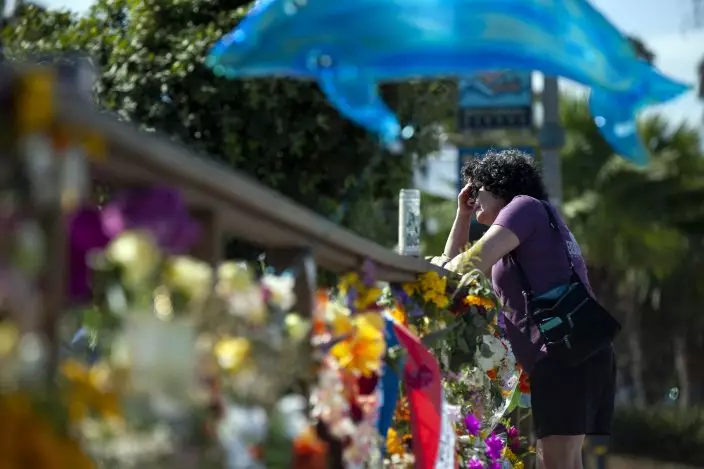The widow of a passenger who died in a fiery dive boat disaster that killed 34 people in the waters off California sued the vessel's owners Monday.
Christine Dignam, whose husband, Justin Dignam, died when the Conception caught fire Sept. 2 off the Santa Barbara coast, claimed that the boat was unsafe.
The vessel didn't have adequate smoke detectors or firefighting equipment, it lacked enough emergency exits, and a required night watch was not on duty when the flames broke out in the middle of the night, according to the wrongful-death lawsuit filed in federal court in Los Angeles.

FILE - In this Sept. 12, 2019, file photo, the burned hull of the dive boat Conception is brought to the surface by a salvage team off Santa Cruz Island, Calif. The widow of Justin Dignam, one of the 34 people who died in the fire, has filed a lawsuit against the boat's owners, making it the first claim from one of the 34 victims' families. (Brian van der BrugLos Angeles Times via AP, File)
U.S. authorities are conducting criminal and safety investigations into the fire that killed all 33 passengers and one crew member sleeping below deck. The blaze's cause has not been determined.
The lawsuit against Santa Barbara-based Truth Aquatics Inc. is the first from a relative of the victims who died. A crew member who was injured trying to escape the flames previously sued.
Dignam's case is a counterclaim to a lawsuit filed pre-emptively by the boat owners to protect them from liability under a quirk of pre-Civil War maritime law. The limitation of liability lawsuit put anyone with a claim on notice that they have until July 1, 2020, to contest the action.

FILE - In this Sept. 4, 2019, file photo, a woman becomes emotional after placing flowers at a memorial for the victims of the Conception dive boat fire in the Santa Barbara Harbor in Santa Barbara, Calif. The widow of Justin Dignam, one of the 34 people who died in the fire, has filed a lawsuit against the boat's owners, making it the first claim from one of the 34 victims' families. (AP PhotoChristian Monterrosa, File)
For lawsuits by families and others to move forward, lawyers will have to show that the boat's owners, who were on shore, should have known the boat was unsafe at the time of the fire.
Boat owners Glen and Dana Fritzler said in their lawsuit that they "used reasonable care to make the Conception seaworthy, and she was, at all relevant times, tight, staunch, and strong, fully and properly manned, equipped and supplied and in all respects seaworthy and fit for the service in which she was engaged."
Coast Guard records show the boat had passed its two most recent safety inspections without violations, but authorities said all six crew members were asleep when the pre-dawn fire started. That goes against Coast Guard regulations requiring a "roving" night watch.
While the fire's cause remains under investigation, the new lawsuit hints at the mess of electrical wires and cables where passengers charged their phones, video cameras, strobe lights and other battery-powered equipment. The equipment was in the galley above the guest sleeping quarters.
The lawsuit said the boat was not equipped with a safe electrical system.
Truth Aquatics voluntarily suspended its fleet last month. Lawyers for the boat company did not immediately respond to emails seeking comment on the lawsuit.
Justin Dignam, 58, of Anaheim Hills, has a teenage daughter and son. He was a veteran water polo player and coach who was chief executive officer at a payroll company he founded.










